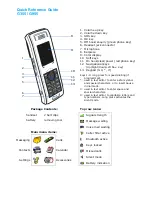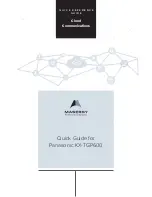
Safety precautions for proper grounding installation
CAUTION:
Connecting to improperly grounded equipment can result in an electric shock to your device.
Safety precautions for power supply unit
Use the correct external power source
A product should be operated only from the type of power source indicated on the electrical ratings label.
If you are not sure of the type of power source required, consult your authorized service provider or local
power company. For a product that operates from battery power or other sources, refer to the operating
instructions that are included with the product. This product should be operated only with the following
designated power supply unit(s).
Travel charger: Input: 100-240V, 50/60Hz, 0.5A
Output: 5.0V/9V/12V, 3.0A/2.0A/1.5A
Handle battery packs carefully
This product contains a Lithium-ion polymer or Lithium-ion battery. There is a risk of fire and burns if the
battery pack is handled improperly. Do not attempt to open or service the battery pack. Do not disassemble,
crush, puncture, short external contacts or circuits, dispose of in fire or water, or expose a battery pack to
temperatures higher than 140˚F (60˚C).
WARNING:
Danger of explosion if battery is incorrectly replaced. To reduce risk of fire or burns, do not
disassemble, crush, puncture, short external contacts, expose to temperature above 140˚F (60˚C), or
dispose of in fire or water. Replace only with specified batteries. Recycle or dispose of used batteries
according to the local regulations or reference guide supplied with your product.
NOTE:
This product should be operated only with the following designated Battery Pack(s).
Take extra precautions
• Keep the battery or device dry and away from water or any liquid as it may cause a short circuit.
• Keep metal objects away so they don’t come in contact with the battery or its connectors as it may lead to
short circuit during operation.
• The phone should only be connected to products that bear the USB-IF logo or have completed the USB-IF
compliance program.
• Do not use a battery that appears damaged, deformed, discolored, or one that has any rust on its casing,
overheats, or emits a foul odor.
• Always keep the battery out of the reach of babies and small children, to avoid swallowing of the battery.
Consult the doctor immediately if the battery is swallowed.
• Only use a battery with a charging system that has been qualified with the system per this standard,
IEEEStd- 1725-2011. Use of an unqualified battery or charger may present a risk of fire, explosion, leakage
or other hazard.
• Replace the battery only with another battery that has been qualified with the system per this standard,
IEEEStd- 1725-2011. Use of an unqualified battery may present a risk of fire, explosion, leakage or other
hazard.
• Avoid dropping the phone or battery. If the phone or battery is dropped, especially on a hard surface, and
the user suspects damage, take it to a service center for inspection.
If the battery leaks:
• Do not allow the leaking fluid to come in contact with skin or clothing. If already in contact, flush the
affected area immediately with clean water and seek medical advice.
• Do not allow the leaking fluid to come in contact with eyes. If already in contact, DO NOT rub; rinse with
clean water immediately and seek medical advice.
• Take extra precautions to keep a leaking battery away from fire as there is a danger of ignition or explosion.
Safety precautions for direct sunlight
Keep this product away from excessive moisture and extreme temperatures. Do not leave the product or
its battery inside a vehicle or in places where the temperature may exceed 140˚F (60˚C), such as on a car
dashboard, windowsill, or behind a glass that is exposed to direct sunlight or strong ultraviolet light for
extended periods of time. This may damage the product, overheat the battery, or pose a risk to the vehicle.
PROTECT YOUR HEARING
To prevent possible hearing damage, do not listen at high volume levels for long periods. Exercise
caution when holding your device near your ear while the loudspeaker is in use.
Safety in aircraft
Due to the possible interference caused by this product to an aircraft’s navigation system and its
communications network, using this device’s phone function on board an airplane is against the law in most
countries. If you want to use this device when on board an aircraft, remember to turn off your phone by
switching to Airplane Mode.
Environment restrictions
Do not use this product in gas stations, fuel depots, chemical plants or where blasting operations are in
progress, or in potentially explosive atmospheres such as fueling areas, fuel storehouses, below deck on
boats, chemical plants, fuel or chemical transfer or storage facilities, and areas where the air contains
chemicals or particles, such as grain, dust, or metal powders. Please be aware that sparks in such areas
could cause an explosion or fire resulting in bodily injury or even death.
Explosive atmospheres
When in any area with a potentially explosive atmosphere or where flammable materials exist, the product
should be turned off and the user should obey all signs and instructions. Sparks in such areas could cause an
explosion or fire resulting in bodily injury or even death.
Users are advised not to use the equipment at refueling points such as service or gas stations and are
reminded of the need to observe restrictions on the use of radio equipment in fuel depots, chemical plants,
or where blasting operations are in progress. Areas with a potentially explosive atmosphere are often, but not
always, clearly marked. These include fueling areas, below deck on boats, fuel or chemical transfer or storage
facilities, and areas where the air contains chemicals or particles, such as grain, dust, or metal powders.
Road safety
Full attention must be given to driving at all times in order to reduce the risk of an accident. Using a phone
while driving (even with a hands-free kit) may cause distraction and can lead to an accident. You must comply
with local laws and regulations restricting the use of wireless devices while driving.





































